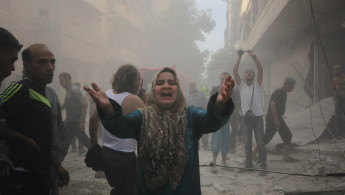Aid futile without halt to barrel bombing of Aleppo
He had become instantly captivated by the city, one of the most ancient in the world, when he studied its history.
In mid-August, Frank crossed the Turkish-Syrian border, heading to the war-torn city in the first time in his life.
| Frank says he felt as if the gate was speaking to him, saying: 'Don't be afraid, Aleppo will never die' |
The assignment was to help deliver aid to the city from the German people.
He went there believing he would find a completely devastated ghost city, devoid of all life.
This was the image social media and news outlets constantly carried of Aleppo after all.
However, halfway through his journey, Frank became extremely concerned.
At the entrance of the town of Azaz, he met with his guide Majed.
To Frank's surprise, Majed was cheerful; he had not expected to find anyone smiling in this place.
The two men set off. The closer they got to Aleppo, the louder the noise of warplanes and fighting became, and the stronger the smell of gunpowder.
More and more destruction started to occupy the landscape ahead.
Aleppo is split into two parts.
The largest is under the control of the Syrian regime. The Ramoussa district is considered the entrance to the rebel-held part.
It is through Ramoussa that Frank and Majed had to cross into their destination, the rebel-held Salah al-Din district.
Frank needed to collect information on the city's needs to complete his assignment as quickly as possible.
He decided to ask Majed to take him on a field visit to the rebel-held neighbourhoods.
The guide warned him it would be dangerous, with the planes circling over the city since the early morning that day.
Frank did not care; he wanted to return home as quickly as possible.
The first stop was the Bab al-Hadid district. The scene there was post-apocalyptic.
Entire buildings had been levelled to the ground. The historical eponymous Bab al-Hadid gate must have borne witness to a lot of destruction across the eons, Frank thought.
Frank says he felt as if the gate was speaking to him, saying: "Don't be afraid, Aleppo will never die."
"The gate was momentous, just like Aleppo's history," Frank told al-Araby al-Jadeed.
The German aid worker and his guide carried on walking through the narrow historical alleyways leading to al-Keltawia, an old madrassa.
Suddenly, a barrel bomb was dropped from a regime chopper not far from where they were standing.
Ambulances and fire engines rushed to the scene, as civil defence crews looked for survivors.
When Frank reached the site, there were pools of blood on the street, as dust and smoke filled the air.
Frank says what caught his attention most was a survivor who was covered with white plaster, stained with blood.
The man then kneeled down and started praying for God to save his children, who were trapped under the rubble.
By the time civil defence crews were done, the final death toll had risen to four. Dozens others were injured.
Frank scanned the area, and he remembers telling Majed: "There are no military positions here. Just homes and shops."
| Attacks using barrel bombs dropped from helicopters killed more than 3,000 civilians in Aleppo governorate last year. |
He was shocked. He finally understood why so many people are leaving to Europe, in search of safety.
It was much worse than he had imagined it to be, he told al-Araby al-Jadeed.
"Death roams the roads, and life here has no meaning."
As night fell, Frank and Majed returned to Salah al-Din. On the way back - incomprehensibly to Frank - he saw children playing even as the sound of shelling nearby could still be heard.
He could not sleep for a single moment that night. In the morning, Frank met with the representatives of aid organisations and got what he needed.
At noon, he left again through Ramoussa, and headed to Turkey. From there, he flew to Germany.
Throughout his trip, Frank wondered what use what all that aid in the end.
The best way to help the people of Aleppo, he thought to himself, was to find a way to protect it and its people from the barrel bombs raining death on them from above.
Attacks using barrel bombs - oil barrels, fuel tanks or gas cylinders packed with explosives, fuel, and metal fragments dropped from helicopters - killed more than 3,000 civilians in Aleppo governorate last year, and more than 11,000 in Syria since 2012, reported Amnesty International in May.
The Syrian government has failed to acknowledge a single civilian casualty caused by such attacks, with President Assad denying that barrel bombs had ever been used by his forces in a media interview in February 2015.



